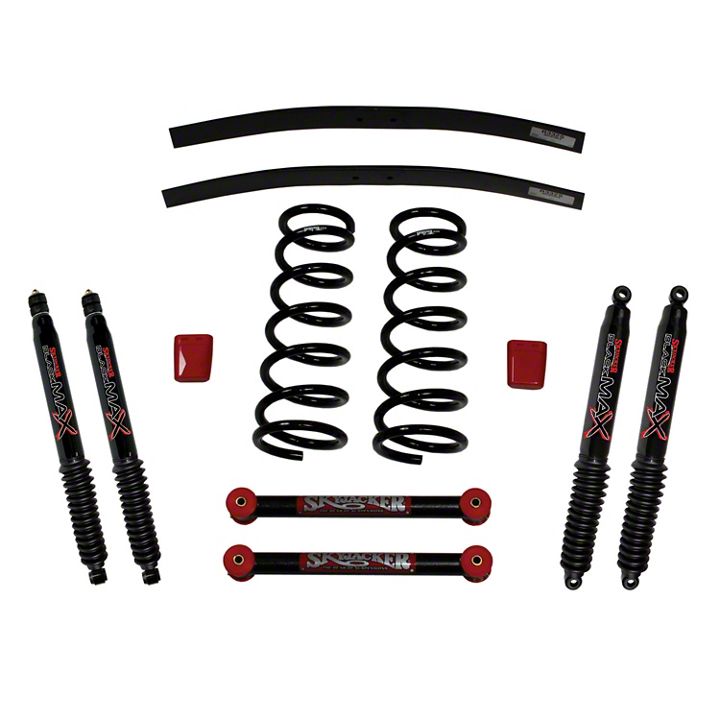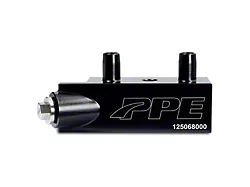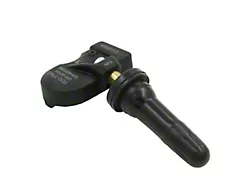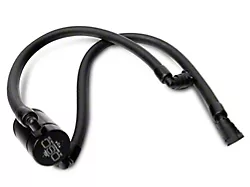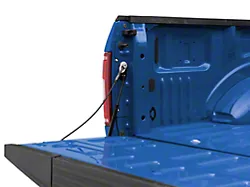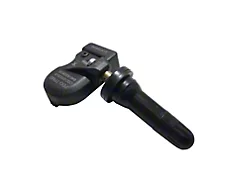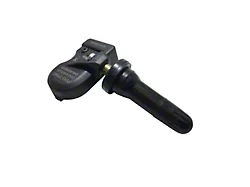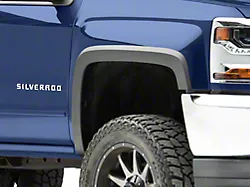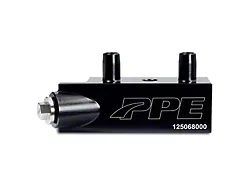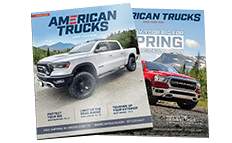
How to Install SkyJacker 2.5-3.5 in. Class I Suspension Lift Kit w/ Shocks (06-07 4WD RAM 1500) on your Dodge RAM
Shop Parts in this Guide
IMPORTANT NOTES:
• Check Coil Spring Part Number: Kits beginning with “D30” and include #D30 coil springs are for all 1/2 tons and 3/4 tons up to 7,500# GVWR (which have lighter rated front coil springs and 21⁄2" wide rear springs).
Kits beginning with “D25” and include #D25 coil springs are designed for heavy Heavy Duty 3/4 ton models equipped with V10 and Cummins Diesel engines (which have heavier rated front coil springs and 3" wide rear springs). If equipped with a “Camper Package” or “Towing Package”, longer u-bolts may be necessary, and possibly spring spacers #SP1230.
• On 3/4 tons, it is recommended to check GVWR rating and width of rear springs to assure you have the correct kit before beginning installation. If in question, call SKYJACKER’s® Technical Assistance department at 318-388-0816.
• Before beginning installation, models with rear springs consisting of an overload spacer and overload leaf on top of rear spring pack, may need longer rear u-bolts (compare the u-bolts supplied in this kit to be sure they are at least 11⁄2" longer). This is found on models equipped with a “Camper Package” or “Towing Package”.
• Dually models will receive less lift than stated and usually have a “Camper Package” or “Towing Package”, which may require longer u-bolts, and possibly spring spacers #SP1230.
• Under NO circumstances are SKYJACKER® coil springs to be used in conjunction with any type of coil spring or spring tower block/spacer. The use of coil spring block/spacers will allow ANY coil spring to exceed its designed stress and travel loads allowing it be overstressed, oversprung, fatigued, and possibly break. SKYJACKER® warranty is void under any such application.
PRE-INSTALLATION NOTES:
• A professional mechanic is recommended to perform the installation..
• Read the instructions carefully and study the photo illustrations before attempting installation.
• Secure and properly block the vehicle on a level concrete or asphalt surface.
• Always wear safety glasses.
• Foot pound torque reading are listed on the Torque Specifications chart below and should be followed unless specifically stated. Apply Loctite retaining compound where specified.

ACCESSORIES:
• Dual Steering Stabilizer #7217WR (Shown at right)
• Polyurethane Sway Bar Bushing Kit #DSB94
Included in Class II lifts:
• Front Dual Shock Kit #DS390 (2 additional shock required)
• Lower Link Skid Plates #DSP2345
The SOFTRIDE® rear springs used in the Systems are also available separately.

FINAL NOTES:
• After installation is complete, double check that all nuts and bolts are tight. (Do not retighten nut and bolt where Loctite was used.) Check to ensure there is adequate clearance between All rotating, mobile and fixed members.
• Rotate driveshafts and check for interference at differential yoke and cardan joint. If necessary, lightly dress casting(s) and/or U-joint tabs in order to eliminate binding.
• Check to ensure there is adequate clearance between All rotating, mobile and fixed members.
• Check clearance between inner side wall of tires. It may be necessary to reset steering stops to eliminate interference.
• Ensure there is adequate clearance between exhaust and brakelines, fuel lines, fuel tank, floor board, and wiring harnesses. Check steering gear for interference and proper working order. Inspect brakelines for damage and adequate clearance. Test brake system.
• With the vehicle on the floor, cycle steering lock to lock and inspect steering, suspension, driveline and brakeline systems for proper operation, tightness and adequate clearance.
• Have headlights readjusted to proper settings.
• Front end realignment is necessary so have a qualified alignment center realign front end to factory specifications.
FRONT:
1. Secure and properly block the tires of vehicle on a level concrete or asphalt surface.
2. Open hood, remove the upper shock nuts and retainers, remove the 3 nuts on the upper shock tower brackets and remove brackets.
3. Jack up front of vehicle and install jack stands under frame behind the lower link rear brackets. Remove tires and the brakeline anchor bracket between the upper and lower links behind coil spring.
4. Loosen trackbar at the axle housing, then remove other end from the frame (see picture #1), and lower down. Remove drag link from pitman arm (see picture #2) and lower it down.
5. If installing Skyjacker’s® drop pitman arm (#DA300, optional), then remove pitman arm from steering sector (a puller will be required, see picture #3). Install new Skyjacker® drop pitman arm using the original lock washer and nut, and torque to OEM specs (do not reinstall drag link to pitman arm at this time). Completely remove original steering stabilizer (it cannot be reinstalled when using a drop pitman arm, but a replacement one is available from Skyjacker®, #7017WR to be used with drop pitman arms or #7007W to be used with original pitman arm, or #7217WR dual stabilizer kit with any pitman arm).
6. Loosen the front sway bar bolts at frame, but do not remove. At the differential end of the sway bar, remove the nuts and rubber bushings from sway bar studs and lower them down (see picture #4). Note: a replacement polyurethane bushing kit is available, Skyjacker® part #DSB94.)
7. Remove upper shock tower (see picture #5), remove lower shock bolts and pull shocks up through the coil spring under the hood. Now lower front axle down until coil springs become loose. Remove coils, rubber insulator and 3-bolt tower ring. Locate the front rubber bumpstops, mounted on the frame rail behind the coils.




8. Remove bumpstop from its pocket by using a large flat screwdriver to pry them out or using a pair of channel lock pliers working them back and forth. At the front lower link adjustment cams, mark (with an ink marker, or scribe a mark) the vertical line on the cam and the reinforcement bracket for reference so you can realign the marks after installation. (See picture #6.)
9. Install drive-in zirc fittings in each end of links by using a 1/4" socket over the fitting, tap with a hammer until fitting is completely tapped in.

10.Install poly bushings #2617 and steel sleeves (2.645" long) in each end of lower links. Be sure to slightly grease them prior to installation. Now remove and replace the lower links with new Skyjacker® links (one side at a time). Only start these bolts, do not tighten at this time. NOTE: so that the links may be greased while on the vehicle, install the lower links with the zirc fittings positioned as follows: front eye of link has fitting pointing out the end, rear eye of link should have the fitting pointing down.
11.If purchased Class 2, including new upper links, install poly bushings #2618 and steel sleeves (2.375" long) in each end of upper/smaller links. Be sure to slightly grease them prior to installation. Now remove and replace* the upper links with new Skyjacker® links (one side at a time) by inserting link into original front mounts until adequate clearance is acquired to bolt rear eye first, then bolt front eye. Only start these bolts, do not tighten at this time. NOTE: so that the links may be greased while on the vehicle, install the upper links with the zirc fittings positioned as follows: front eye of link has fitting pointing out the end, rear eye should have the fitting pointing down. * If installing dual shock kit, included in the Class 2 suspensions, it is important to see those instructions at this time.
12.To begin coil spring installation, insert original 3-bolt tower ring in place inside top of coil tower, and start a couple of the nuts just to hold ring in place (do not tighten). NOTE: If installing dual shock kit, included in the Class 2 suspensions, refer back to those instructions at this time.
13.Start coil springs at bottom, place rubber isolator on top of coil and then start coil into position in the upper tower, on both sides. Align coil springs so that the end of the bottom wraps are turned to the inside at the center of the axle. Lift up on jack under differential until coil springs are securely in place, and keep a load on them to hold in place. NOTE: On kits starting with "D3" (for 1/2 tons and light 3/4 tons-without V10/Cummins engines), the coil springs are labeled driver and passenger side and must be installed on appropriate side. On kits beginning with "D2" (for heavy 3/4 and 1 tons with V10 and Cummins engines) there are not specific driver side and passenger side coil springs.
14.Now remove nuts that were put on 3-bolt tower ring in step 12. Install new shocks down through coil towers under hood and install lower bolts. Place a retainer and poly bushing on shock stems. Now install* original upper shock bracket that was removed in step 7 (picture #5) over 3 bolts of tower ring, install 7/16" self locking nuts and tighten. Install shock grommets, retainer washers and nuts. Tighten nuts. *If installing dual shock kit, included in the Class 2 suspensions, refer back to those instructions at this time.
15.Raise drag link up and reinstall to pitman arm. Note: If Skyjacker’s® new drop pitman arm was installed in step #5, loosen turn buckle clamps on drag link and rotate 180o and install in the bottom end of pitman arm (see picture #7), and tighten to OEM specs. Now tighten turn buckle with the clamps and bolts rotated to the top side of drag link to provide clearance for the steering stabilizer boot.
16.Reinstall steering stabilizer. Note: with a drop pitman arm installed, the original steering stabilizer will not mount up; replace with Skyjacker #7017WR or dual steering stabilizer kit #7217WR.
17.Take the stud ends of the front sway bar and swing them back up, reattach and tighten. Retighten sway bar bolts on frame. Reattach and tighten brakeline anchor brackets between the upper and lower links behind coil springs.
18.Install tires, remove jack stands, and lower vehicle to the ground.
19.Place the new poly bumpstops in the original bumpstop pocket. By using leverage against the bottom of bumpstop, force the bumpstop into place (it may be helpful to use a 2x4 and block, see picture #8).


20.Raise track bar up, reattached at frame (see picture #1) and tighten to OEM specs. (may need to turn steering wheel in order to realign holes when reinstalling bolt.) Tighten to OEM specs. and reinstall cotter pin. Retighten track bar bolt on axle housing.
21.Tighten each end of the new links, being sure to realign the marks on the eccentric cams. Thoroughly grease all zirc fittings. After the lift is complete take vehicle to a qualified alignment shop so that caster, toe-in, toe-out and steering wheel alignment can be checked.
22.Install polyurethane bushings and steel sleeves in bottom eyes of front shocks (the front shocks are those with a "stud" top and "eye" bottom), and place a washer and stem bushing on the upper studs of the shocks. From under the hood, lower the shocks down through the coil spring, install and tighten bottom bolts.
Remove the nuts on the coil spring's 3-bolt tower ring installed previously. Now place the original shock tower over the shock's stud and align over the threads of the 3-bolt tower ring. Install and tighten self locking nuts on both tower rings. Install upper shock stem bushings, washers, lock washer and nuts. Tighten nuts. NOTE: If installing dual shock kit, included in Class 2 suspensions, refer back to those instructions at this time.
WARNING: On the Dodge Ram trucks, the front shock absorbers limit extended position of the front suspension! The use of shocks other than those supplied in this system, may cause coil disengagement, adverse steering angles, brakehose failure, driveline component failure, and/or other related component failure! The use of other shocks will void your Skyjacker® warranty!
23. If installing Class 2, install new lower link skid plates under-neath the front of lower link assemblies, using the 5/16 x 1" carriage bolts furnished. Position the brackets so that the holes are closest to the front bumper (see picture #9).
REAR:
1. Place a floor jack under rear axle and raise vehicle. Place jack stands under the frame to support vehicle and remove the rear tires and shock absorbers.
2. Remove the axle U-bolts and lower axle down a few inches. Care should be taken because when U-bolts are removed, axle can move freely.
IF INSTALLING A SOFTRIDE® “SYSTEM” WITH NEW REAR SPRINGS, SKIP TO STEP #6.

3. ADD-A-LEAF INSTALLATION: To perform the installation of add-a-leafs properly you must use two large C-clamps to contain the elastic potential energy in a leaf spring when the center tie bolt is being removed. Attach and tighten a C-clamp on leaf spring on both sides of the center tie bolt to hold spring assembly securely together Using vise-grips to hold the head of the center bolt, loosen and remove it. With care, slowly loosen and remove the C-clamps and spring's bottom overload leaf, if equipped.
4. Insert new tie bolt through original bottom overload leaf, if equipped, new add-a-leaf (add-a-leaf must be installed with long end toward the rear of the vehicle), and then through original spring pack. Only finger tighten the tie bolt nut at this time.
5. DO NOT USE THE CENTER TIE BOLT TO DRAW SPRING LEAVES TOGETHER. FAILURE OF ANY COMPONENT CAN CAUSE AN EXPLOSIVE DISASSEMBLY AND POSSIBLE INJURY! Place one Cclamp on each side of the center bolt and tighten evenly. Once C-clamp has drawn leaves securely together, hold the center tie bolt head with vise-grips and tighten nut. Remove C-clamps. Skip to step 9.
6. Raise the rear axle back up, aligning spring pins into original blocks and being sure block pins are still aligned in axle housing. Install original u-bolts and tighten evenly.
7. NEW SPRING INSTALLATION: Safely support fuel tank. Loosen vent and fill hoses on filler neck. Loosen, do not remove, the front fuel tank strap bolt. Disconnect and remove the rear bolt and strap (see picture #10). Carefully slide fuel tank toward center of vehicle to acquire sufficient room to access the driver side front spring eye bolt.
Remove the rear blocks and leaf springs (notice short and long end of springs) from the vehicle. It will be necessary on the driver side, to pry the gas tank away from frame allowing more room to remove and reinstall factory bolt. NOTE: do not pry gas tank too much or lower down too much because the fitting at top may be broken off. Install new springs with the long end of springs toward the rear bumper. The original rear blocks are not reinstalled with these new rear springs.
Reconnect rear fuel tank strap and bolt, tighten front strap bolt, and tighten vent and fill hoses on filler neck.
8. Raise the rear axle back up, aligning spring pins into axle housing. Install and tighten new u-bolts evenly (torque new u-bolts to 85-90 ft.lbs.).
9. Install rear shock absorbers, tires, remove jack stands and lower vehicle down. Review “FINAL NOTES” on page 2.

